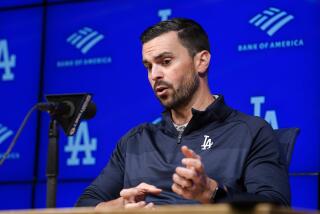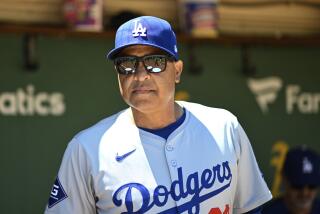New Boss Has Much on His Plate to Ponder
NEW YORK — As a lifelong fan of the Dodgers dating to Brooklyn, Robert Daly’s passion is such that the club’s success--or lack of it--established the tone at the family dinner table. The Dodgers’ new chairman obviously must have found 1999 difficult to digest.
With high hopes and one of baseball’s highest payrolls, the Dodgers produced one of their most disappointing and dispiriting seasons. Their 77-85 record equated to slightly more than $1 million per win based on a payroll of $80.6 million, the industry’s third highest.
Speaking in the aftermath of his introductory news conference Thursday, Daly said he will never commit to a total rebuilding project or purge of the type the Florida Marlins went through after their World Series triumph in 1997.
He said his only immediate promise is that the 2000 season will be far more palatable than ‘99, but he had not been on the job long enough to analyze a complex situation.
“I know we have a lot of players with long-term commitments,” he said. “Fortunately, a lot of them are good players.”
Maybe not enough, however.
The reality--we’re always available to assist with an analysis, of course--is that the Dodgers are in an untenable position, economically and in terms of talent.
The farm system, perhaps aside from pitcher Eric Gagne, has little help, and the Dodgers are already committed to paying 11 players $69.7 million next year.
Among those are several high-salaried players for whom there is no market and no certainty of their long-term ability to contribute.
They include: Todd Hundley, owed $6.5 million through his 2001 buyout; Carlos Perez, owed $12.5 million over the next two years; Devon White, owed $9.9 million over the next two; Eric Young, owed $9 million over the next two, and Alan Mills, owed $5.25 million over that same period.
What can Daly do?
Well, aside from recognizing the need for patience--a difficult task when you’re trying to sell luxury boxes that go for as much as $390,000--and the likelihood that it will take a year or two to dig out, there are some clear recommendations:
* Put General Manager Kevin Malone and Manager Davey Johnson on a narrow timetable for proving they can handle their assignments.
Johnson, an otherwise proven winner, seemed to have lost the clubhouse at times during a summer of frequent player complaints, often employed contradictory strategy despite his reputation as a master strategist, never responded to the lethargy with a public display of emotion, and spit on integrity by not insisting that Kevin Brown pitch and Gary Sheffield play in the season’s final game in Houston, when the Astros had a playoff bid on the line.
Malone inherited a difficult situation with a barren farm system and complex contracts. He made things worse with his outrageous predictions in the spring--as well as the Charles Johnson/Roger Cedeno trade for the physically impaired Hundley; the financial commitments to Perez, White and Brown (Malone took it to $105 million while negotiating against himself); the trade that sent valuable spot starter Dave Mlicki to Detroit with nothing in return, the scapegoat firing of pitching coach Charlie Hough and the seeming lack of meaningful discipline when Raul Mondesi verbally assaulted management and also snubbed teammates by choosing to sit in the bullpen rather than the dugout as the Dodgers batted during a game in Arizona.
Daly said he admires Johnson and Malone and both will be there next season, which is not exactly a ringing endorsement since Johnson has two years remaining on his contract and Malone has three.
* Give longtime friend Tom Lasorda--”I hope he’s with the Dodgers forever,” Daly said--a defined role and make sure he remains within the confines of that role. Lasorda is still a wonderful ambassador for the club and motivational source for young players in the system, but problems tend to develop when Lasorda is perceived to be politicking for something more. Daly said he would demand that his staff be rowing in the same direction, and that should apply to his frequent lunch pal as well.
* Re-sign Eric Karros for two years. Malone, given his other long-term commitments, has said he can’t and won’t negotiate an extension beyond the $5 million Karros is owed in 2000, but Karros is a last link to the tradition and loyalty that Daly values so highly. Besides, only two National League first basemen--Mark McGwire and Jeff Bagwell--hit more home runs than Karros, who tied a career high with 34 homers and set a career high with 112 runs batted in.
* Trade Mondesi and Ismael Valdes. The former is a 30-home run, 30-stolen-base talent and the latter is only 26 and may some day win 20 games. However, too many teammates continue to question Valdes’ fortitude to think that it won’t eventually evolve into a combustible incident, and behavioral issues continue to plague Mondesi, who will remain burdened as a Dodger by the albatross of great expectations.
Seattle shortstop Alex Rodriguez is an attractive lure to the Dodgers, but whether they can meet the Mariner trade demands is doubtful and whether they would also be able to meet Rodriguez’s contract demands given their other commitments is also doubtful. By trading Mondesi--not easy given the $20.5 million he is guaranteed over the next two years--and Valdes in separate deals, however, the Dodgers, at a minimum, should be able to acquire a proven left-handed hitter and starting pitcher, along with a couple of much-needed prospects.
* Keep Sheffield focused on the field. Any Dodger hopes for a quick turnaround rest with his potentially productive bat. He has said he doesn’t want to remain if the Dodgers don’t improve, but he is another virtually untradable player because of his contract and injury history, and Sheffield has to be made to understand that management will do its job and he has to do his, no matter what the lineup looks like. At $10 million per year, no excuses.
All of that is just a start. There is more to be done, and the new chairman will be involved in all of it. He will never undermine his manager or general manager, he said, but he will be watching closely, will challenge their thinking and will insist that any trade or free-agent signing fits the long-term plan. Any such acquisition at what could be called a staggering sum, Daly said, will still be run past Fox officials, but the Dodgers will never purge, the roster will always include “major stars who are paid lots of money balanced by up-and-coming young players.” A balance illustrated, he added, by the Cincinnati Reds this season in almost reaching the playoffs with a modest payroll of $33 million.
The Dodgers, of course, first have to develop those young players.
In the meantime, Daly is likely to discover there is no easy recipe for changing the tone of the family dinner hour.
More to Read
Are you a true-blue fan?
Get our Dodgers Dugout newsletter for insights, news and much more.
You may occasionally receive promotional content from the Los Angeles Times.










